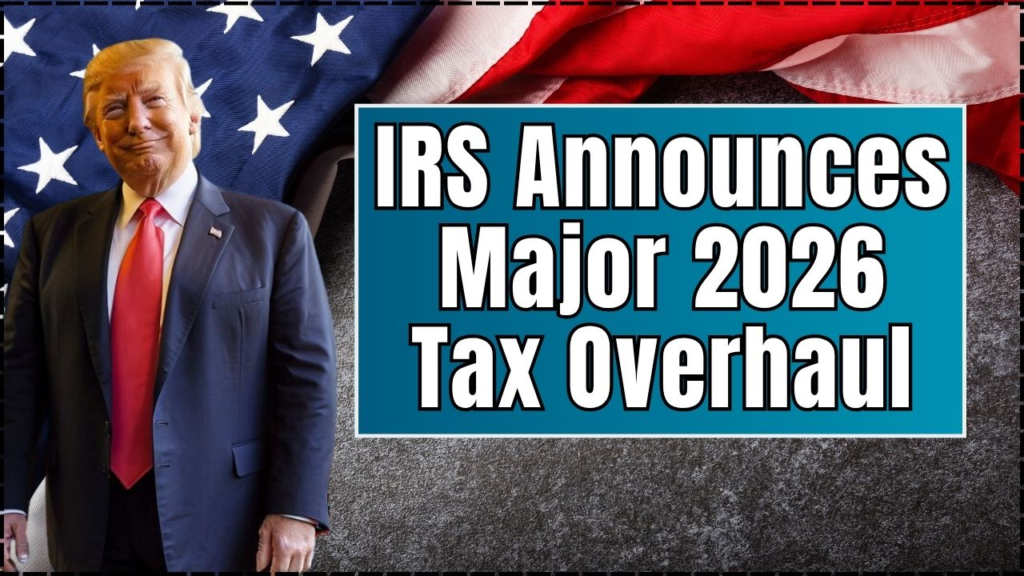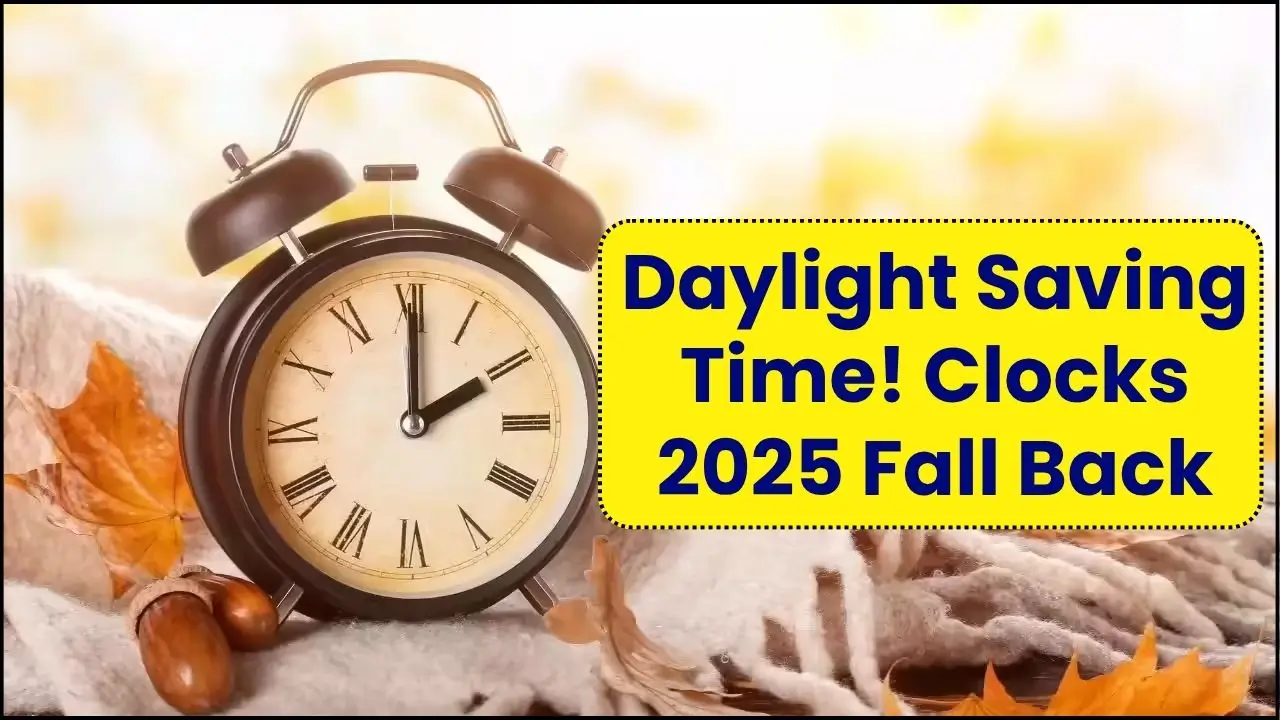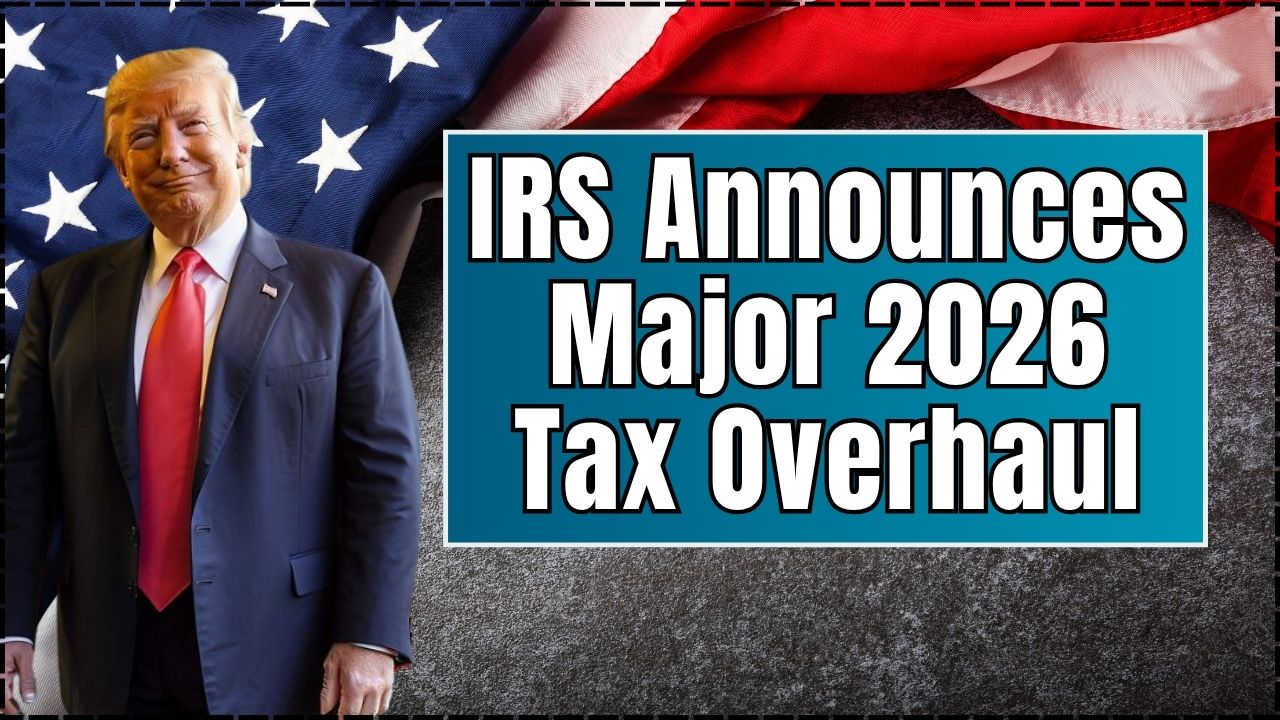The Internal Revenue Service (IRS) has announced a comprehensive overhaul of U.S. tax laws for the 2026 tax year, with notable changes that will benefit seniors, particularly those aged 65 and older. This reform, part of the broader One Big Beautiful Bill Act (OBBBA) signed into law in mid-2025, aims to reduce financial strain on older Americans. By increasing the standard deduction and offering new relief measures, the IRS hopes to provide more financial stability to retirees and seniors on fixed incomes.

The major elements of this tax overhaul target some of the unique financial challenges faced by seniors, from rising healthcare costs to fluctuating retirement income. Here’s an in-depth look at what this new tax overhaul means for older Americans and the broader economy.
Table of Contents
IRS Announces Major 2026 Tax Reforms
The 2026 tax overhaul is expected to provide significant relief to seniors. Here is an overview of the most crucial changes, as well as how they will benefit older Americans:
| Key Fact | Detail |
|---|---|
| Increased Standard Deductions | Standard deductions for seniors will rise for both single and married taxpayers. |
| Additional Senior Deductions | Seniors aged 65 and older will receive an additional $2,050 if single, or $3,300 if married. |
| Senior Bonus Deduction | A new $6,000 bonus deduction for seniors (phased out for higher incomes). |
| Official Website | IRS |
Seniors who stand to benefit from the 2026 tax overhaul should begin planning now. Tax professionals recommend reviewing your income sources, expenses, and eligibility for the new deductions to ensure you maximize the relief available.
As the IRS continues to finalize the details of this overhaul, seniors are advised to stay informed and adjust their financial plans accordingly. The overhaul promises to offer much-needed tax relief for older Americans in 2026, helping many seniors ease their financial burdens during retirement.
Expanded Standard Deductions
Starting in 2026, the IRS will raise the standard deductions for all taxpayers. These increases will benefit seniors especially, providing more financial breathing room for those relying on retirement savings or pensions.
- Single Filers: The standard deduction rises to $16,100 from $15,750 in 2025.
- Married Filing Jointly: The standard deduction will be $32,200, up from $31,500 in 2025.
- Heads of Household: The standard deduction increases to $24,150, up from $23,625.
For seniors, these increases are even more significant, as those aged 65 or older will receive an additional standard deduction of $2,050 if filing as single, or $3,300 for married couples. This additional amount aims to offset the rising costs associated with aging, such as healthcare, housing, and daily living expenses.
The Senior Bonus Deduction: A New Relief Measure
In addition to raising the standard deduction, the IRS will also offer a $6,000 senior bonus deduction, which will help reduce taxable income. This new measure, part of the OBBBA, is designed specifically for seniors to help them deal with increasing medical expenses and the financial challenges associated with aging.
- The bonus deduction is not subject to income limits for those under $75,000 (single) or $150,000 (married filing jointly). However, the bonus phases out for higher-income earners, making it more targeted for seniors who are struggling with rising costs but still have relatively low or moderate incomes.
Real-World Impact: How Much Will Seniors Save?
The new tax changes will have varying levels of impact depending on a senior’s filing status and income. Let’s explore an example of how these deductions will affect a single filer aged 66 and a married couple both aged 65 or older.
For a Single Senior (66 years old):
- Standard Deduction: $16,100
- Additional Deduction: $2,050
- Senior Bonus Deduction: $6,000
- Total Deductions: $24,150
For seniors who rely on fixed incomes such as Social Security or pensions, this total increase in deductions will significantly lower their taxable income, reducing their overall tax liability.
For a Married Couple, Both Aged 65 or Older:
- Standard Deduction: $32,200
- Additional Deduction: $3,300
- Senior Bonus Deduction: $12,000
- Total Deductions: $47,500
In this case, the couple could see an even larger reduction in their taxable income. The senior bonus deduction, in particular, provides a substantial increase to the overall tax relief, offering new savings for couples who are likely facing rising healthcare or housing costs.
Historical Context: How This Overhaul Compares to Previous Tax Reforms
This overhaul represents one of the most significant shifts in tax policy in recent years, especially in how it supports seniors. Previous reforms, such as the Tax Cuts and Jobs Act of 2017, made various changes to the tax code, but they did not specifically target senior citizens. This 2026 overhaul seeks to address issues unique to aging populations, like healthcare costs, lower or fixed retirement incomes, and the increased likelihood of medical deductions due to aging-related conditions.
In the past, tax reforms had not adequately adjusted deductions to match the specific needs of seniors, especially when compared to other forms of financial assistance. This 2026 reform aims to rectify that by creating targeted relief measures such as the senior bonus deduction and the increased standard deduction, ensuring that seniors receive a fairer tax treatment as they face rising living expenses.
Broader Economic Impacts of the Overhaul
Beyond providing relief to seniors, this tax overhaul could have broader economic implications. According to Dr. William Foster, a senior economist at the Brookings Institution, increasing the disposable income of seniors through tax deductions may help stimulate the economy.
“Seniors are among the most consistent spenders in the economy, particularly when it comes to healthcare, housing, and food. Increasing their disposable income will likely result in more spending, which could have a positive ripple effect on local economies,” said Dr. Foster.
However, there are concerns that the overhaul might lead to increased federal spending, which could add to the national deficit. Critics argue that the changes, while beneficial for seniors, could increase the tax burden on younger generations or taxpayers with higher incomes. Furthermore, some experts are concerned that the phased-out senior bonus deduction might leave out those seniors who need the support the most.
Social Security and Medicare: How They Are Affected
One of the key components of the OBBBA is its alignment with the federal government’s ongoing efforts to stabilize programs such as Social Security and Medicare. While this tax overhaul does not directly change the structure of these programs, it is seen as part of a broader strategy to ensure that seniors receive comprehensive support in both their tax filings and their benefits.
In particular, the senior bonus deduction is expected to work hand-in-hand with other senior-focused benefits, such as the rising Social Security cost-of-living adjustments (COLAs), which help offset inflationary pressures on seniors. By providing these simultaneous forms of financial relief, the U.S. government aims to offer a more holistic approach to senior welfare.
What Experts Are Saying About the Overhaul
John Harris, a tax policy expert at the National Taxpayers Union, explains that this overhaul is designed to strike a balance between providing direct relief to seniors while ensuring the sustainability of the tax system.
“The increased deductions will offer immediate financial relief, but it’s essential to understand that these changes are just one part of a larger picture. We need to ensure that the long-term fiscal health of the system is maintained, so future generations can benefit as well,” Harris said.
IRS to Send $1,390 Direct Deposit Relief in 2025 – Are You Eligible?
FAQ About IRS 2026 Tax Reforms
Q: Will the senior bonus deduction apply to all seniors?
A: No. The senior bonus deduction is phased out for individuals with a Modified Adjusted Gross Income (MAGI) above $75,000 for single filers or $150,000 for married couples filing jointly.
Q: How will the new deductions affect my tax return?
A: Seniors will see an increase in their standard deduction, as well as additional deductions for those aged 65 or older, potentially lowering their taxable income and reducing their overall tax liability.
Q: When will these changes take effect?
A: These tax changes will apply to the 2026 tax year, meaning they will be reflected in filings made in early 2027.
















